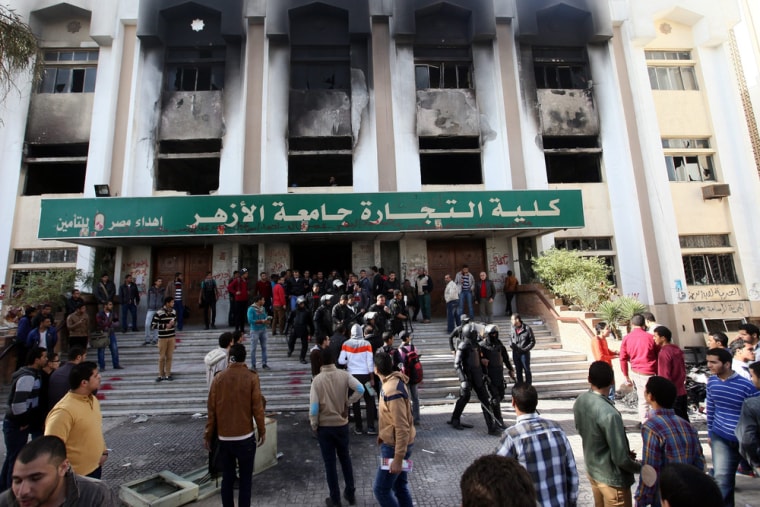CAIRO/ANSHAS — A bomb exploded outside an Egyptian army building north of Cairo on Sunday, wounding four soldiers, the army said, in the second bomb attack on security forces in the Nile Delta in less than a week.
The bomb partly destroyed the back wall of the military intelligence building in the village of Anshas, 60 miles north of the capital.
The army described the bombing as a terrorist attack. Its statement referred to "groups of darkness" and did not name the Muslim Brotherhood, the Islamist group it declared a terrorist organization last week.
That decision was a response to a suicide bomb attack on Tuesday on a police compound in the Nile Delta city of Mansoura, north of the site of Sunday's explosion.
The army-backed government has used the new classification to detain hundreds of the movement's supporters and thousands more are already in jail. Some of those detained in recent days are students, who have continued daily protests in spite of the increased penalties for loyalty to the Brotherhood.
The government had accused the Brotherhood of carrying out last week's suicide bombing, which killed 16 people and for which a radical Sinai-based group called Ansar Bayt al-Maqdis claimed responsibility.
In Anshas, some residents were quick to blame the Brotherhood for Sunday's attack: "The Brotherhood want to scare people so they don't come out for the referendum," said Ahmed Salah, wearing a dusty tracksuit and standing near the damaged building.
The next step in the government's political transition plan is a mid-January referendum on a new constitution, which it has said the violence will not derail.
But the two latest explosions point to the widening reach of militant attacks that have become commonplace since the army deposed Islamist President Mohamed Mursi in July.
Ansar Bayt al-Maqdis has claimed other major attacks since Mursi's downfall, including a failed attempt to assassinate the interior minister in September.
Around 350 police and soldiers have been killed in bombings and shootings since Mursi was deposed, most of them in the Sinai Peninsula, where Islamist radicals expanded into a security vacuum left by the Hosni Mubarak's downfall in early 2011.
Security forces killed hundreds of Mursi's supporters in the months after his removal and have arrested thousands more.
Three security sources said Sunday's explosion came from a bomb near the building, but did not specify where it was planted. State-run Nile News TV station said it was a car bomb.
Five people were wounded by a bomb that went off near a bus in Cairo on Thursday. That bomb appeared to be the first targeting civilians, though there was no claim of responsibility saying what had been targeted.
The authorities say they have defused several other bombs in recent days, including one in a bag left outside a university building in the Nile Delta city of Damietta on Sunday.
MORE ATTACKS EXPECTED
Already high political tensions have escalated since last week's suicide attack.
Some analysts say Egypt faces the risk of a protracted spell of Islamist attacks, as well as civil strife fueled by friction between supporters and opponents of the Muslim Brotherhood: street clashes have killed seven people in the past three days.
Student protesters battled police for a third day at Al-Azhar University, where the Brotherhood has rallied support in recent months, putting the prestigious institution at the heart of its struggle to keep its cause alive.
Students allied to the Brotherhood say they are boycotting end-of-term exams to protest the killing of classmates by security forces.
Security sources said 35 students were treated for the effects of tear gas fired by police during protests at Al-Azhar's campus in the Delta city of Zagazig. Fifteen were hospitalized.
The government has declared itself in "a war on terror" as it steers Egypt through a transition plan expected to yield presidential and parliamentary elections next year.
Army chief Abdel Fattah al-Sisi, who led Mursi's overthrow, is widely seen as the favorite to win that election, though he has yet to declare his candidacy.
Ansar Bayt al-Maqdis emerged in North Sinai after Mubarak's downfall, mounting attacks including a string of bombings targeting a pipeline used to export gas to Israel and Jordan.
"There will be more (attacks). I don't think that any factor has changed that would lessen the attacks at least in the short term," said HA Hellyer, a Cairo-based fellow with the Royal United Services Institute.
"Those that oppose the army and want to see Mursi's reinstatement go beyond the Muslim Brotherhood - and it is likely some non-Brotherhood Islamists have turned to violence, including, but not exclusively, those within the Ansar Bayt al Maqdis group," he said.
Related:
Student killed as Brotherhood supporters clash with police in Cairo
